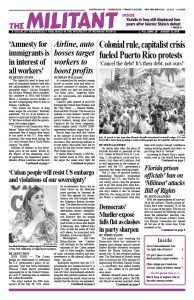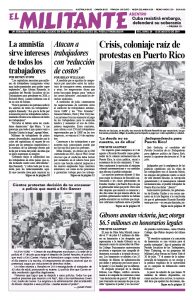Sixty-six years ago on July 26, workers and youth, led by Fidel Castro, attacked the Moncada military barracks in Santiago, Cuba. The brutal regime of Fulgencio Batista had seized power, cancelled elections and arrested or murdered those who challenged his rule. The attack — aimed at galvanizing popular opposition to the dictatorship — was defeated and many of the combatants, captured alive, were tortured and murdered by the regime’s thugs. But it signaled the opening of the Cuban Revolution and the forging of a revolutionary leadership.
Five and a half years after the attack, the July 26th Movement led working people to overthrow Batista, deepen their struggles and go on to establish their own government, beginning the transformation of society.
U.S. imperialism was shocked that the program of the revolutionary movement — put forward by Fidel during his trial for the assault on Moncada and widely promoted throughout the island — was not just pretty words, it was carried out.
The large agricultural estates were nationalized and put under workers control or distributed to landless peasants. Factories were taken over by workers. A massive literacy campaign was launched to teach workers and farmers to read and write. Working people became masters of their own destinies. Hundreds of thousands have volunteered for internationalist missions to advance the struggles of workers and farmers elsewhere around the world, acting on Castro’s explanation that “those not willing to fight for the freedom of others will never be able to fight for their own.”
The U.S. rulers have never forgiven working people for not just changing the faces of those in power but transgressing against capitalist property and profits — especially of U.S. bosses. And they have never given up on their dream of restoring U.S. domination of the island. That’s why Washington’s economic war on Cuba never ends.
What working people from the U.S. to Puerto Rico and across the globe can learn from the experience of the Cuban Revolution is as important today as the day workers and farmers in Cuba took power.
As Jack Barnes put it in Cuba and the Coming American Revolution, working people of Cuba showed us “that with class solidarity, political consciousness, courage, focused and persistent efforts at education, and a revolutionary leadership of a caliber like that in Cuba — a leadership tested and forged in battle over years — it is possible to stand up to enormous might and seemingly insurmountable odds and win.”

